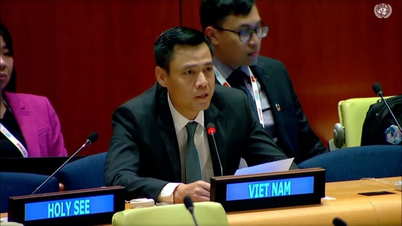Legalizing Resolution 42/2017 will bring great results
Bank credit (TDNH) is the most traditional and main activity of credit institutions, originating from the nature of the formation and development of banking activities: Mobilizing capital from the economy (receiving deposits) and using this capital to lend back to the economy.
Therefore, the occurrence of bad debt associated with the failure of credit institutions to collect debts or to collect debts at the wrong time will not only directly affect the credit activities of credit institutions but also affect the capital circulation process in the entire economy...
The banking industry in general and credit institutions in particular are always interested in solutions to limit bad debts arising, control credit quality well through the system of credit monetary mechanisms and banking activities. In particular, from a professional perspective, credit institutions always focus on solutions to improve credit appraisal quality; implement a variety of solutions to ensure loans and collect debts effectively; strengthen inspection work before, during and after lending; expand customer relations and achieve sustainable growth.
However, in the process of handling and recovering debts, there are still many limitations and shortcomings, as well as the responsibilities of customers in borrowing and repaying bank loans...
Therefore, the legalization of Resolution 42/2017/QH14 dated June 21, 2017 of the National Assembly on piloting the handling of bad debts of credit institutions not only directly affects the handling of bad debts and handling of collateral to recover debts; but also brings greater and more comprehensive results in implementing the task of stabilizing the macro economy, promoting the country's economic growth in the new era, the era of national development.
Contribute to improving borrower responsibility
Specifically, when legalizing the right to seize collateral for loans, it will contribute to enhancing the responsibility of borrowers. That is the responsibility to use loan capital effectively, for the right purpose to repay the loan, both principal and interest. This is especially important in the entire process of borrowing, using capital and planning loans. Only using loan capital for the right purpose, in accordance with the business plan, can promote the effectiveness of loan capital and the ability to repay the loan of customers.
From the perspective of law and credit relations, when the borrower cannot repay the debt, the right to recover the debt and handle the collateral belongs to the lender in accordance with the nature of credit. This meaning requires the responsibility to exercise the rights and obligations of the borrower and use the credit capital.
 |
Legalizing the right to seize collateral will limit the occurrence of bad debts and effectively increase credit growth. (Photo in article: Ha Phuong Thao) |
In addition, legalizing the right to seize collateral will limit the occurrence of bad debts and increase effective credit growth. This effectiveness comes from the nature of credit and the responsibility requirements of borrowers. When implementing the repayment principle, borrowers increase their responsibility in using loans effectively, using loans for the right purposes, capital goes into production, business, trade and services, thereby creating products, generating income and having cash flow to repay bank loans, which will limit overdue debts and bad debts.
This not only contributes to promoting business development but also promotes the growth of production and business activities and the growth of the entire economy. At the same time, it creates conditions for credit institutions to continue to expand and grow credit safely and effectively.
Legalizing the right to seize collateral and handle collateral for loans will contribute to effective debt collection by reducing costs and processing time. This is especially meaningful in cases where customers intentionally delay in cooperating with banks to handle collateral as well as the responsibility to repay bank loans.
Today (May 22), in Ho Chi Minh City, PLVN Newspaper - Representative Office in Ho Chi Minh City organized a seminar "Need to continue legalizing some issues in the spirit of Resolution 42/2017/QH14 on XLNX" with the participation of sponsors from the Bank for Agriculture and Rural Development - Agribank , MCV Group Corporation, Mobile Technology Corporation. The program is expected to have the participation of representatives of the State Bank, the Department of THADS, the People's Procuracy - Ho Chi Minh City People's Court along with a number of commercial banks and leading experts in the field. The program will provide useful information, be a forum for people, businesses, agencies, units to express their thoughts, aspirations, difficulties as well as benefits when legalizing Resolution 42/2017.
Source: https://baophapluat.vn/nganh-ngan-hang-luon-quan-tam-cac-giai-phap-han-che-no-xau-post549278.html



![[Photo] Prime Minister Pham Minh Chinh attends the groundbreaking ceremony of Trump International Hung Yen Project](https://vphoto.vietnam.vn/thumb/1200x675/vietnam/resource/IMAGE/2025/5/21/ca84b87a74da4cddb2992a86966284cf)
![[Photo] Prime Minister Pham Minh Chinh receives Rabbi Yoav Ben Tzur, Israeli Minister of Labor](https://vphoto.vietnam.vn/thumb/1200x675/vietnam/resource/IMAGE/2025/5/21/511bf6664512413ca5a275cbf3fb2f65)
![[Photo] Determining the pairs in the team semi-finals of the National Table Tennis Championship of Nhan Dan Newspaper](https://vphoto.vietnam.vn/thumb/1200x675/vietnam/resource/IMAGE/2025/5/21/eacbf7ae6a59497e9ae5da8e63d227bf)

























































































Comment (0)